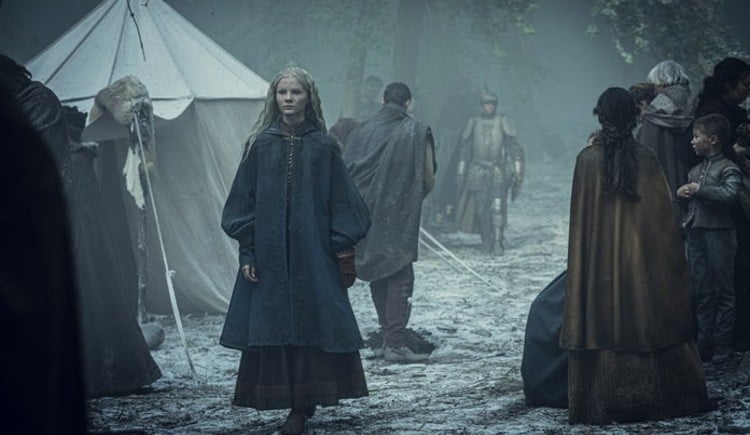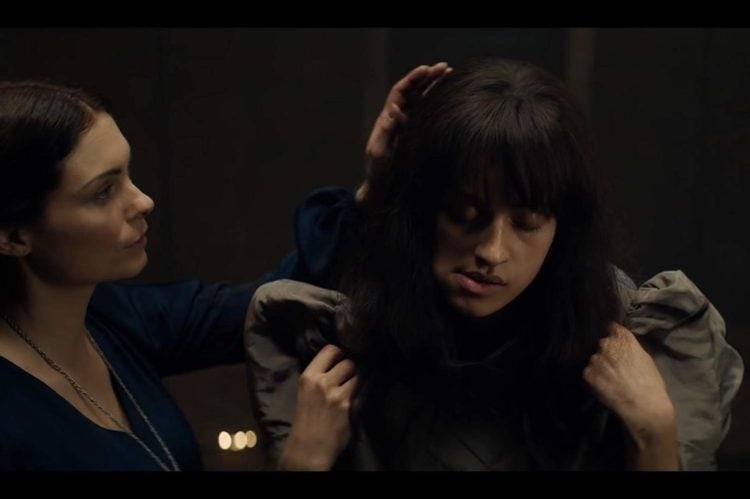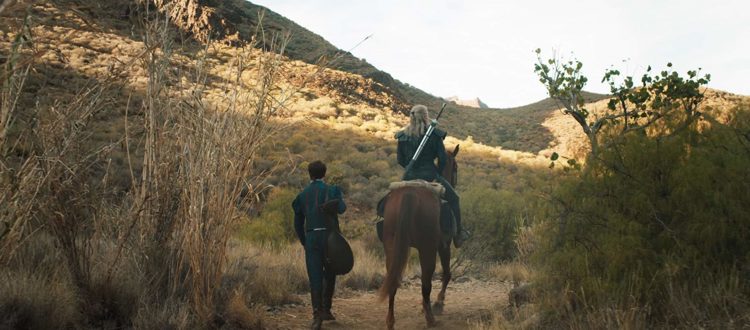
“It is your job to control chaos, not become it.”
Whereas the premiere of ‘The Witcher’ was centered on the divergent paths of Geralt and Ciri, “Four Marks” is unquestionably Yennefer’s (Anya Chalotra, Wanderlust, Sherwood) story. Unlike what Witcher fans may be used to seeing, this isn’t the beautiful and confident sorceress with an acerbic wit. This is the crippled and twisted Yennefer, before she knew the magic dwelling within her. As “The End’s Beginning” introduced Geralt at his core, “Four Marks” does the same for Yen. Watching this young woman attacked and degraded, bereft of confidence or shown such little love or compassion is heartbreaking and that ache will stay with me just as much as Geralt’s artistry in the back alley of Blaviken. But all is not sad; over time Yennefer slowly begins to see that, despite the circumstances that led her to Aretuza and the cool demeanor of Tissaia de Vries (MyAnna Buring, Ripper Street, In the Dark), Yennefer is beginning to find her place in the world, a place where she belongs. In that, “Four Marks” is a perfect complement to its predecessor, dropping in the magical components of the series only glimpsed through Ciri’s escape from Cintra.
Ciri’s story is less involved with the Princess of Cintra as she is in a constant state of flight, save for a quiet moment in the woods with Dara (Wilson Radjou-Pujalte, Jamillah and Aladdin, Hunter Street), a young elf. The reveal of Dara’s heritage is ironic, considering what we learn about the human/elf relationships during the episode’s historical world-building. Though Ciri does get the smallest bits of prejudice suffered by the elven folk, her biggest eye-opener is experiencing the anger and disdain many of Cintra’s citizens have towards her grandmother, Calanthe. Combined with her meeting Dara—who leads Ciri to safety when Nilfgaardian forces attack the Cintran refugees—the Lion Cub of Cintra receives a crash course of the realities her life behind castle walls could never properly teach.

As entwined in Geralt’s life as Ciri and Yennefer, is Jaskier (Joey Batey, Knightfall, C.B. Strike) the bard (Dandelion for you gamers). From the moment he meets the laconic witcher, Jaskier appoints himself as Geralt’s image consultant (more or less). He wants to make the witcher’s exploits known and respected — though not just out of the kindness of his heart — success at that would bring Jaskier his own renown. With his golden pipes and penchant for reframing narratives (some may call it ‘lying’), it’s not a half-bad idea.
Pairing up a character as stoic as Geralt, with someone as garrulous and energetic as Jaskier makes an ideal partnership (even if Geralt himself is reticent to accept Jaskier’s companionship). Batey’s charm and creative timing brings Jaskier to life, selling the relationship and suggests that Geralt’s exploits — however exaggerated — will become known across the land; especially if they are all as catchy as the episode-ending “Toss a Coin” bit that, to be honest, would be at home on any of today’s Top 40 lists.
“Respect doesn’t make history.”
But “Four Marks” is more than its character moments. Jaskier’s extremely meta-comment of “delivering exposition” aside, the second episode continues that difficult task of communicating the historical significance and cultural strife prevalent in this world without breaking the viewer’s immersion into the story. Geralt’s adventure is particularly significant; taking a job to rid a man’s fields of the devil, Geralt and Jaskier are captured by elves hiding in the mountains. Despite Jaskier’s earlier assertions that the elves had moved on to their “golden towers”, the truth is decidedly less spectacular and much bloodier.
Continuing with the idea that fact can be lost in the conflation of myth, often for the purpose of justifying foul deeds, Filavandrel (Tom Canton, Wasted, Dark Heart), the unlikely king of the elves, offers his perspective on how his people were slaughtered in the Great Cleansing, an event that sounds uncomfortably similar to the fate of so many Native Americans during the brutal and violent founding of the United States. The truth of this hammers into Jaskier, shifting his understanding of the Continent’s history but Geralt is less surprised, in part due to his extensive experiences of the dirty nature of life, and more recently the nasty business with Renfri and Stregobor. Geralt’s advice to Filavandrel is a harsh but one of painful truths. You can maintain the life you had, despite events forcing you to change or, as Geralt as shown, you can find a way to get along.
It’s the well-timed theme of choice and how you (in this case, the elves) are responsible for what you do when facing even the most egregious displays of injustice. Struggling along only to complain of what once was will not change things; only your actions can. Similar to Renfri, the elves are stuck in the past and, despite the just anger from the atrocities they’ve suffered, allowing it to rule you only prevents you from moving forward. This focused anger towards the genesis of her pain led to Renfri’s death. And with humanity far outnumbering elves and the latter stuck in a loop of hiding or striking in guerrilla tactics instead of trying to rebuild, even if it’s somewhere else, will only quicken their path to extinction.

As a building block for Yennefer’s character, “Four Marks” is exceptional, solidifying the foundations behind what makes Yen the formidable and sometimes cold person she becomes. But more than her story (or any other character’s), it touches more on the ideas of choice and destiny. Those two words are not idly thrown around but symbolize where Geralt finds himself. For so long his life has run by the choices he’s made, to get involved or not, but after some of Renfri’s whispers came to pass, Geralt is stuck pondering if in fact the girl in the woods is awaiting his intervention. We may know the answer to this but watching Geralt slowly come to terms with the possibility is but one of the things that makes The Witcher such an amazing adventure.
On Being a Witcher
• There’s just so much to love about this series (albeit in two episodes), for fans of the games and books or for those coming into it with no context of the characters. In that regard, Jaskier acts as a sort of stand-in for the audience, “delivering exposition” (an on-the-nose meta-comment right up there with the ‘elf on the shelf’ lyric) but also dropping some of the more familiar sobriquets of the witcher —‘White Wolf’, ‘Butcher of Blaviken’. With his monosyllabic nature, Geralt needs a balancing force and, at least for one episode, Jaskier is the perfect vessel.
• Where the premiere gave me emotional tingles of the geek variety (primarily due to the whole Blaviken business), “Four Marks” left its emotional marks on me for very different reasons. Yennefer’s suffering was difficult to watch, the empathy created by Anya Chalotra nothing short of authentically emotional perfection. I was admittedly hesitant when reading up on the cast — in part from my own ignorance of their talents but also the wash of negativity that surrounded those initial announcements. Two episodes in and I have had no issues with any of the principle actors and cannot wait to see where the rest of this story takes us.
‘The Witcher’: “Four Marks”
9 out of 10
